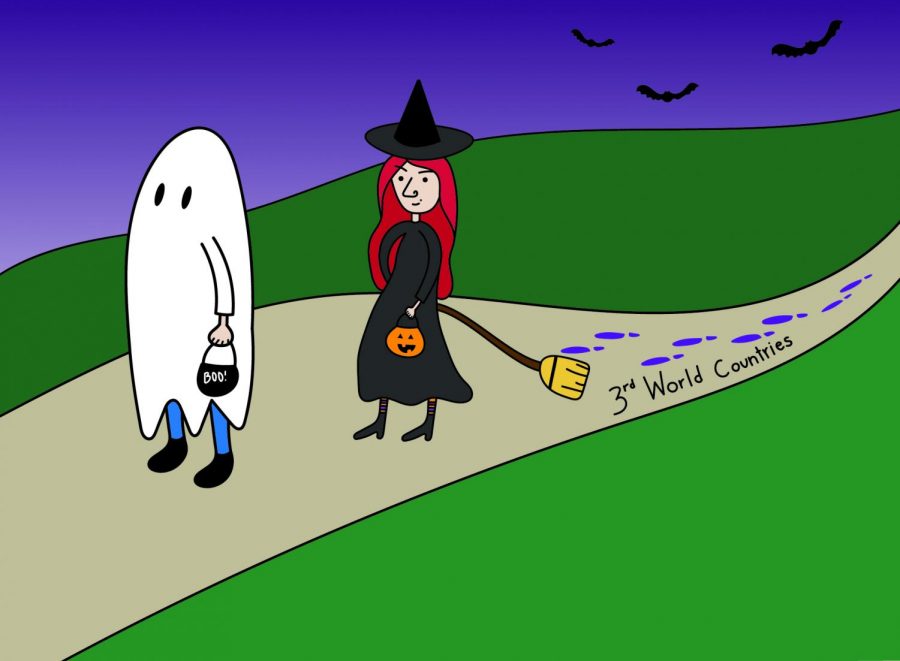Editorial | Halloween is capitalism in costume
October 31, 2019
Every year on this day, millions of young Americans don their spookiest apparel, grab a bag or bucket to hold their loot and — armed with the age-old Halloween greeting, “Trick or treat!” — take to the streets in search of candy.
And every year on this day, the tradition subtly entrenches the imperialistic tendencies of capitalism in the next generation of Americans.
Originating in a Celtic festival called Samhain in which the ancients would wear costumes to ward off ghosts, Halloween as we know it now only exists after centuries of evolution. It wasn’t always about who could coerce the most sweets out of their hard-working neighbors or who could spend the most amount of money buying mass-produced costumes.
But it is like that now.
The Candy Industry blog projected around $9 billion in candy sales for the holiday in 2018. Every year, these billions of dollars buy about 600 million pounds of the sweet stuff, enough for every single American to bring home just under two pounds with their night out on the town.
Get The Daily Illini in your inbox!
Costumes and decorations add another huge amount of money to the holiday, with Spirit Halloween — just one such Halloween conglomerate — raking in $8.4 billion in a single season.
Halloween is quickly joining Christmas as one of the most expensive American holidays, promoting a toxically capitalist environment that threatens to swallow the core idea behind any holiday: a celebration with friends and family.
Aside from the crazy economics of Halloween, parents and citizens in general also promote imperialistic ideals by buying mass-produced costumes. More often than not, these costumes are cheaply produced overseas in countries with lax labor laws and poor working conditions.
The United States exerts its economic influence to force foreign countries to manufacture products for American companies. Often, jobs at U.S.-sourced factories are the only employment options for the local people, and the factory owners exploit this by paying low wages and treating their workers abysmally.
Imperialism is often thought of in terms of military occupation. However, a lesser-known aspect of imperialism is economic control over a foreign country. In this light, the U.S. should still be considered an empire, and its Halloween practices help secure its status as such.
As a holiday already tagged as problematic by a multitude of groups for a variety of different reasons (i.e. cultural appropriation with certain costumes, the contribution to childhood obesity, the mocking of religion, etc.), Halloween doesn’t need another societal issue to make it controversial.
Perhaps it’s time we revisit the ways we celebrate Halloween. If we ever wish to fully cast off the venomous net of imperialism, it’s time we hang up our mass-produced costumes, stop buying pounds of candy every Halloween and say enough is enough with the blow-up ghosts and ghouls. It’s time we think more consciously about how our consumption impacts the world around us.
Every year on this day, millions of young Americans don their spookiest apparel, grab a bag or bucket to hold their loot and — armed with the age-old Halloween greeting, “Trick or treat!” — take to the streets in search of candy.
And every year on this day, the tradition subtly entrenches the imperialistic tendencies of capitalism in the next generation of Americans.
Originating in a Celtic festival called Samhain in which the ancients would wear costumes to ward off ghosts, Halloween as we know it now only exists after centuries of evolution. It wasn’t always about who could coerce the most sweets out of their hard-working neighbors or who could spend the most amount of money buying mass-produced costumes.
But it is like that now.
The Candy Industry blog projected around $9 billion in candy sales for the holiday in 2018. Every year, these billions of dollars buy about 600 million pounds of the sweet stuff, enough for every single American to bring home just under two pounds with their night out on the town.
Costumes and decorations add another huge amount of money to the holiday, with Spirit Halloween — just one such Halloween conglomerate — raking in $8.4 billion in a single season.
Halloween is quickly joining Christmas as one of the most expensive American holidays, promoting a toxically capitalist environment that threatens to swallow the core idea behind any holiday: a celebration with friends and family.
Aside from just the crazy economics of Halloween, parents and citizens in general also promote imperialistic ideals by buying mass-produced costumes. More often than not, these costumes are cheaply produced overseas in countries with lax labor laws and poor working conditions.
The United States exerts its economic influence to force foreign countries to manufacture products for American companies. Often, jobs at U.S.-sourced factories are the only employment options for the local people, and the factory owners exploit this by paying low wages and treating their workers abysmally.
Imperialism is often thought of in terms of military occupation. However, a lesser-known aspect of imperialism is economic control over a foreign country. In this light, the U.S. should still be considered an empire, and its Halloween practices help secure its status as such.
As a holiday already tagged as problematic by a multitude of groups for a variety of different reasons (i.e. cultural appropriation with certain costumes, the contribution to childhood obesity, the mocking of religion, etc.), Halloween doesn’t need another societal issue to make it controversial.
Perhaps it’s time we revisit the ways we celebrate Halloween. If we ever wish to fully cast off the venomous net of imperialism, it’s time we hang up our mass-produced costumes, stop buying pounds of candy every Halloween and say enough is enough with the blow-up ghosts and ghouls. It’s time we think more consciously about how our consumption impacts the world around us.







